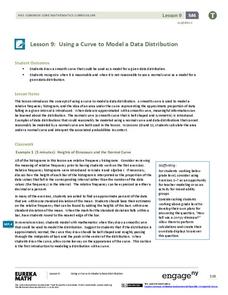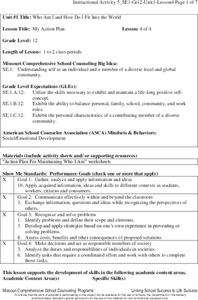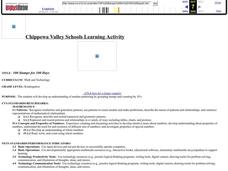EngageNY
Using a Curve to Model a Data Distribution
Show scholars the importance of recognizing a normal curve within a set of data. Learners analyze normal curves and calculate mean and standard deviation.
BPE
Teacher Guide for Faster Passage: "Sympathy" and "Caged Bird" Poetry
Prepare class members for formative assessments of student thinking in reading (FAST-R) with a resource that compares Paul Laurence Dunbar's "Sympathy" and Maya Angelou's "Caged Bird." Readers respond to 10 multiple choice questions and...
Curated OER
Organizing by Writing
Middle schoolers analyze how to use writing for generating and organizing their thoughts before communicating them. They use the questions on the first handout to organize a three-minute introduction of themselves to their small group....
Curated OER
Anti-Semitism Workshop
Originating from the Yad Vashem Holocaust Memorial Museum in Jerusalem, here is a resource to support your world historians in their study of World War II, the Holocaust, your cultural scholars learning about anti-semitism, or your...
Pearson
Contractions, Plural Names, and Possessives: An Editing Exercise
Practice proper apostrophe use with a grammar worksheet. After reviewing contractions, plural names, and possessive nouns, kids fix and rewrite 10 incorrect sentences.
Missouri Department of Elementary
So Much to Do, So Little Time: How Do I Tie All of the Loose Ends Together?
How do people manage to get everything done when there are so few hours in a day? Scholars explore the question as they participate in small group discussions about time management. They construct a daily schedule and complete a...
Missouri Department of Elementary
My Action Plan
To complete a study of the importance of developing a positive self-image, high school seniors complete an "Action Plan for Maintaining Who I Am" worksheet. They then submit their finished worksheets for inclusion in their Personal...
Curated OER
Rhode Island Challenge
In this recognizing facts about the state of Rhode Island worksheet, students read factual information and choose the who, what, or where answer. Students choose 10 multiple choice answers.
Curated OER
Round and Dance Music
Third graders recognize a round in singing groups and apply to choreography movements. In this rounds instructional activity, 3rd graders memorize movements with songs at specific places. Students perform a three part round.
Curated OER
Hershey Bar Equivalent Fractions
Fourth and fifth graders explain how to use equivalent fractions. They recognize which fractions are equivalent. Pupils find equivalent fractions.
Curated OER
Maus: After Reading Strategy Instructional Routine
Class members create literary mandalas for two characters from Maus, Art Spiegelman’s graphic novel about his father’s experiences with the Holocaust. After finding quotes that reveal three good traits and three bad traits of each...
Purdue University
Healthy Body Image: Healthy Exercises for Every Body
From three-way neck rolls to a figure-5 hurdler's stretch, this is an ultimate guide to healthy exercises. It begins with a bulleted list of general guidelines on cardiorespiratory exercise, flexibility, resistance exercises, and range...
DK Publishing
Connect-the-dots Dinosaurs: Reading Numbers
Connecting dots activities can be great number sequencing practice. Here are two dinosaur dot-to-dot pictures that are intended to help learners count, sequence numbers up to 40, and recognize number words. Who doesn't love a good...
College Board
Extrema
No need to go to extreme lengths to find resources on extrema. The central focus of an AP® curriculum module is on critical points and extrema, and how to cover these concepts throughout the course. A set of three worksheets helps assess...
Echoes & Reflections
Contemporary Antisemitism
Despite the recognized atrocities of the Holocaust, anti-semitism continues. The 11th and final installment of the Teaching the Holocaust series explores the long-term effects of the Holocaust on modern anti-semitism, asking pupils to...
Curated OER
Number and Number Relations: Lesson 2
Eighth graders recognize or compute decimal equivalents of fractions. They recognize or compute the percent equivalent of decimal fractions. They relate fraction, decimal, and percent equivalents and recognize decimal equivalents.
Curated OER
Breaking News English: $10 Million for Golf's 15-Year-Old Wie
In this English worksheet, students read "$10 Million for Golf's 15-Year-Old Wie," and then respond to 47 fill in the blank, 7 short answer, 20 matching, and 8 true or false questions about the selection.
Curated OER
Mix Patterns Worksheet
In this number recognition learning exercise, students recognize patterns in numbers. Students are given four or five numbers for each of the twenty problems and are to determine the next number by figuring out the pattern.
Curated OER
Roman Numeral Math
Students solve math problems using Roman numerals. In this roman numerals lesson, students use suggested websites to develop an understanding of Roman numerals and solve simple addition equations. Students create a chart of Roman...
Curated OER
100 Stamps for 100 Days
Students recognize similarities and generalize patterns. In this math and technology lesson plan, students develop an understanding of number patterning by grouping stamps and counting by 10s.
Curated OER
Finding Identical Numbers - Standard Form
Students explore the concept of recognizing identical numbers in different forms. In this recognizing identical numbers instructional activity, students recognize identical numbers in word form and number form.
Curated OER
Ones and Tens
Students identify the relationship between ones and tens in place value. They use place value mats and straws to identify tens and ones and group the ones to represent tens. After writing and discussing the numbers 10 and 20 they...
Curated OER
Rounding
In this rounding worksheet, learners solve 40 problems in which whole numbers are rounded to the nearest 10. 100 or 1000. Students also round to the nearest dollar.
Curated OER
Fractions
Fifth graders, after inventorying, add up the numerators of their fractions to see if it is the same number as the denominator. If it is, then they are ready to build whatever they wish, but using only what is in their individual inventory.























